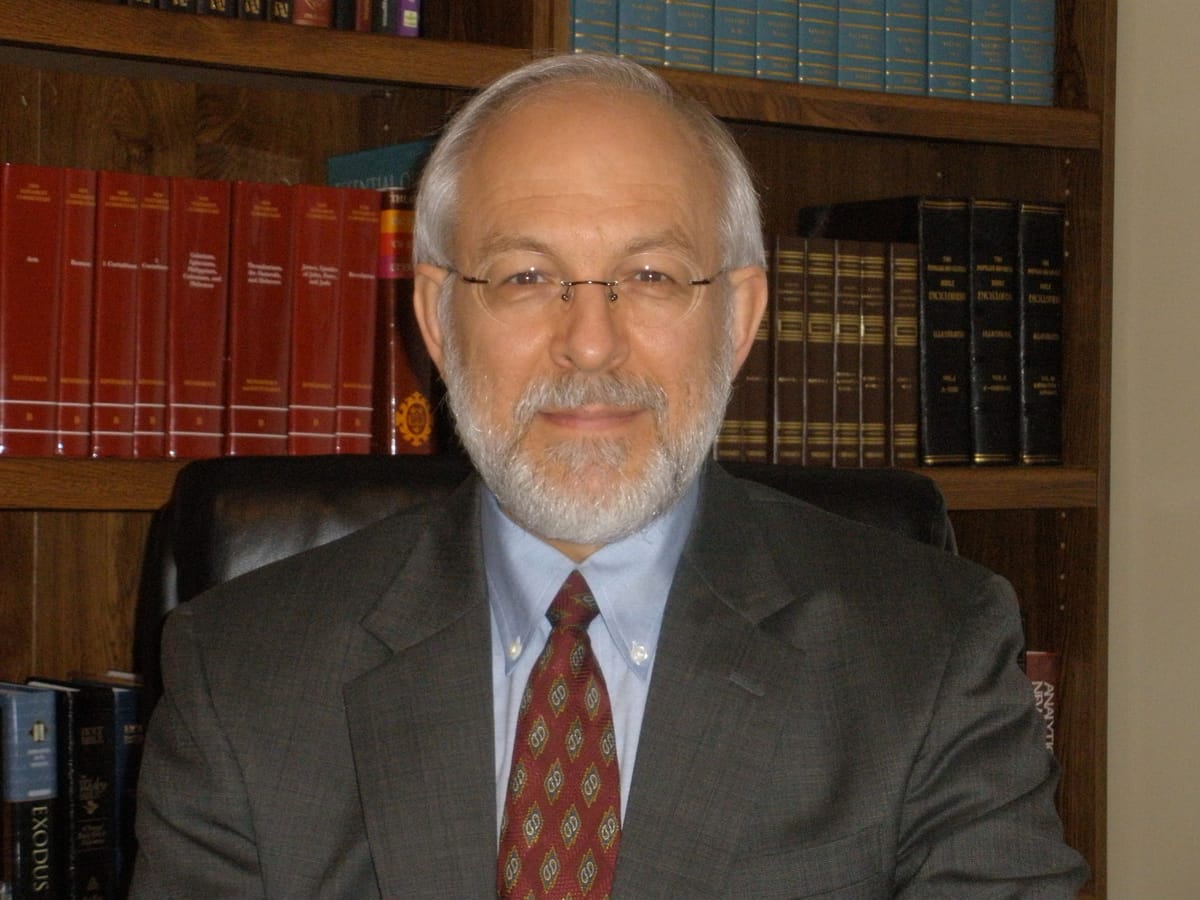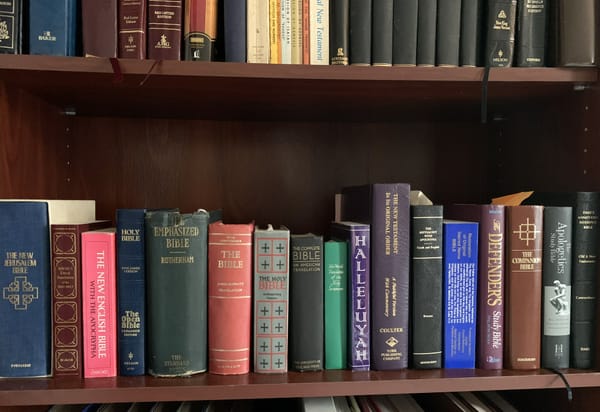Chapter 2, Section 2: The Doctrine of Inspiration cont'd.
In the New Testament there were many miracles recorded attesting to the truth of the gospel. The signs and wonders that followed the Apostles gave proof that the gospel was true. Another way that we know that the Bible is inspired is because of its results. It changes lives.
I imagine that everyone reading these words can attest that your life is being changed or has been changed because of the Bible. The early apostles and disciples, after they heard the gospel, devoted their lives, and in fact gave their lives, for this idea that the Scriptures were true and that Christ Jesus was God in the flesh and that He fulfilled the Scriptures. Would you give your life for an idea if you did not really believe it?
In the last two millennia, millions of the saints of God have had their lives changed because of this Word, this Bible. You can take the most depraved, vile, and wicked person and find numerous occasions, where they have been confronted with the Word of God and have had their lives changed totally to where they have become a person of godly character.
Not only have individual lives been changed, but collective lives have been changed. Nations have been changed. The course of history has been changed because of the Bible. Although numerous examples could be cited, I will mention only one at this juncture, the time of the French Revolution.
That conspiracy was engineered through the secret societies; namely, the Illuminati, founded in 1776 by one, Adam Weishaupt, who then used it to infiltrate the Freemasons. (Note: I have known/know many Freemasons, who are good men; so do not take this historical fact to mean that this writer is condemning the good men among them. I have detailed this much more extensively in some of my other lecture series.)
The Illuminati plan was to start to destroy Christianity in France and then spread it from there—to include England. Praise God, it did not happen in England because, I believe, the people turned to God.
They repented in a great revival which had broken out just about the same time. We are not stating that every single soul in England turned to God, but in general, with the population turning back to the Bible, I think God spared them from the horrors that was the French Revolution.
Another way that we know that the Bible is inspired is because of its Providential preservation. It has survived many attempts to destroy it, and it continues to survive. Much more on the aspect of divine preservation later in this series.
Presently, I want to zero in on and spend the rest of this chapter on another particular aspect of why we know the Bible is inspired, and that is simply this: Because it says so.
That is circular reasoning, someone says. It is a return to the notion that you can prove the Bible by the Bible. Can this legitimately be done? Is the Bible, perhaps, a special case where it can be legitimately be won by appealing to circular reasoning? I think we can make excellent sense of it, but as we do, I think you will see that it is not actually circular reasoning any more.
Let me illustrate first with an analogy. If you have known a person very well, for say, twenty years or more, and he has proven himself to be a very faithful and good friend. He is a man of great integrity and truth in all matters that you have ever known.
And if, as your friend, he has even been bold enough to confront you with a harsh and unpleasant truth when he knew you needed to hear it. He has been that good a friend to you. He has always been there to offer wise counsel and advice whenever you wanted to turn to him.
If you have known that type of man for over twenty years, I guarantee you, you do not have any hesitancy in accepting something that he might say about himself as truth. You have known that type of man, and if he says something about himself, you can guarantee it is true. So it is with the Bible.
One of the best ways to prove to yourself the veracity of the Sacred Writ is to read it and study it, and read it and study it, and read it some more and study it some more. You will come to know, beyond doubt, through personal experience with God and His Word, that His Word is true.
I found an insightful quote along these lines by Louis Gaussen. Dr. Gaussen was a Swiss clergyman, and is the author of the greatest single work to come out of the nineteenth century on the subject of The Plenary Inspiration of the Scriptures. And I quote:
Read the Bible. It is the Bible that will convince you. It will tell you whether it came from God. And when you shall have heard a voice there, sometimes more powerful than the sound of mighty waters, sometimes soft and still as the voice that fell on the ear of Elijah.
The Lord, merciful and compassionate. And God is pitiful, slow to wrath, abundant in mercy, the God of all consolations, the God who pardons so much and more.
Ah, then we venture to tell you beforehand that the simple reading of the Psalms, of a story, of a precept, of a verse, of a word within a verse, will ere long attest the divine inspiration of all the Scriptures to you more powerfully than the most solid reasoning of learned men or of books.
Then you will see. You will know by experience that God is everywhere in Scriptures. Then you will not ask of them whether they are inspired, for you will feel them to be quick and powerful searchers of the thoughts and desires of the heart.
Sharper than any two-edged sword, piercing to the dividing asunder of your soul and spirit causing your tears to flow from a deep and unknown source, overthrowing you with resistless power and raising you up again with such a tenderness and such sympathies that are found only in God. END QUOTE
As I read that last part, I thought of the many times that I have read the Bible, and especially certain stories in it, that I cannot help myself; tears well up in me. The story of Joseph is one of those. I break down and weep as the brothers are reunited.
“Causing your tears to flow from a deep and unknown source.” Why does that happen? “Overthrowing you with resistless power and raising you up again with such tenderness and such sympathies that are found only in God.” That is one way to know. You come to know it by experience.
There is yet another very powerful argument that counters the charge that we argue the truth of the Bible by the Bible. Let me lay the groundwork for this rather lengthy explanation.
As many of my readers know, I was raised in a Roman Catholic family, what is termed in Catholic circles as a “staunch Catholic.” I went to the seminary for my high school years, but dropped out in my first year of college. But that was where I received my first studies in Greek and Hebrew. Later, I was fortunate in the early to mid-1990s to have a private tutor in those Bible languages—which I have described earlier in this series.
One of the characteristics of Catholics is—and I was a stellar example of it—that they have no Bible knowledge. (Or at least in those years, that was almost universally true of the Catholic laity. I do believe that is changing, however, based on my interactions with a couple of my siblings who remained in the Catholic church.)
After I left Catholicism in my late teens, I turned into a heathen—an unbeliever. But not an atheist, not an agnostic. I always believed in the existence of God, the Supreme Being and Creator of all. I still believed in the reality of Jesus Christ, etc.
But I became an unbeliever in the version of Christianity that I was immersed in from childhood up through dropping out of seminary. It was not that I vehemently opposed the gospel, it simply was not important in my life at that time.
When I was (honorably) discharged from the United States Air Force, I was enrolled at the Ohio State University in Columbus. Somewhere along the course of my pursuit of a B. A., I signed up for a class which I think was called “The English Bible as Literature.”
A woman professor was in charge of that class. I enjoyed it, and we used the New English Bible for that course. As I look back in retrospect, it is clear to me that this was simply a platform for the professor to attack the Bible.
A number of my classmates, who were active in The Campus Crusade for Christ, became really heated about some of the things the professor said. However, I was enjoying the class. As part of our homework, we had to write papers about certain subjects that she assigned. Since my essays were always in a critical mode, pointing out what I then perceived as contradictions in the Bible, I received A’s on all my papers, and and “A’ in the end of course grade.
As I look back, I was searching for answers but did not know it. One of the things about that course that I remember distinctly was her attitude (and she may not have said it in exactly these words), but she asserted that the Bible was just a collection of myths—that there was very little evidence that this Jesus Christ person ever existed.
I beg your pardon! That is historically inaccurate. There is more evidence for the existence of Jesus Christ than just about any other person of antiquity, and from sources other than Christians. Josephus, a non-Christian historian, wrote of Jesus in his Antiquities of the Jews.
Quoting from Dr. David Noebel’s fascinating book (about 900 pages), Understanding the Times: The Story of the Biblical Christian, Marxist-Leninist, and Secular Humanist World Views, on page 772, he makes this statement. QUOTE:
Early historians, other than Christians, treated Christ as a historical figure. Around A.D. 93, the great Jewish historian, Josephus, referred to Jesus at least twice in his Antiquities of the Jews. … In an earlier and more celebrated instance in Antiquities, Chapter XVIII, paragraph 3, sentence 2, Josephus spoke of the attention on Jesus himself. There is some question about precisely what the original text said, but the most likely reading appears to have been “At this time, there was a wise man who was called Jesus. And His conduct was good, and he was known to be virtuous, and many people from among the Jews and other nations became his disciples.
Pilate condemned him to be crucified and to die, and those who had become his disciples did not abandon his discipleship. They reported that he had appeared to them three days after his crucifixion and that he was alive. Accordingly he was perhaps the Messiah concerning whom the prophets have recounted wonders.”
Despite the questions about the precise wording of the text, there is no serious doubt that Josephus did refer to Jesus Christ and to the movement that stemmed from him. END QUOTE

The Works of Josephus are nearly 2,000 years old. There have been several translations and various editions of his works. Dr. Noebel’s version is obviously different from mine because my edition references this same passage as Book XVIII, Chapter III, Paragraph 3, and it translates this passage thusly:
“Now, there was about this time, Jesus, a wise man, if it be lawful to call him a man, for he was a doer of wonderful works—a teacher of such men as receive the truth with pleasure. He drew over to him both many of the Jews, and many of the Gentiles.
He was [the] Christ; and when Pilate, at the suggestion of the principal men amongst us, had condemned him to the cross, those that loved him at the first did not forsake him, for he appeared to them alive again the third day, as the divine prophets had foretold these and ten thousand other wonderful things concerning him, and the tribe of Christians, so named from him, are not extinct at this day.”
As the reader can discern, these are essentially the same, although not word-for-word. From a footnote in another book, which is in reference to that specific question about the wording of the text, it says this. QUOTE:
For a discussion, see the New York Times press release, February 12, 1972, published under the title “Christ Documentation: Israeli Scholars Find Ancient Documents They Feel Confirms the Existence of Jesus.” END QUOTE
Hmmm…. Israeli scholars find documents that confirm the existence of Jesus? Is that not interesting? Continuing from Dr. Noebel’s book, page 772, QUOTE:
Another early historian, Cornelius Tacitus, wrote about A.D. 112 about “the persons commonly called Christians.” And also stated, “Christus, the founder of the name, was put to death by Pontius Pilate, Procurator of Judea, in the time of Tiberius, but the pernicious superstition repressed for a time broke out again, not only through Judea, where the mischief originated, but through the City of Rome itself.”
Not only did we have Josephus and we had the Roman historian Tacitus, but we also have the Roman historian, Suetonius, who mentioned Jesus in his work, The Lives of Claudius, written circa A.D. 120 and also the Roman historian, Pliny the Younger, who wrote of Jesus in a letter circa A.D. 112.
Dr. Noebel goes on to say this. QUOTE:
These references and others provide sufficient evidence for the historicity of Christ, even when the New Testament is ignored. Bruce Metzger writes that “The early non-Christian testimonies concerning Jesus, though scanty, are sufficient to prove, even without taking into account the evidence contained in the New Testament, that He was a historical figure who lived in Palestine in the early years of the first century, that He gathered a group of followers about himself, and that He was condemned to death under Pontius Pilate. Today no competent scholar denies the historicity of Jesus.”
And in another place, Noebel states, QUOTE:
New Testament scholar, Bruce Metzger agrees. “Some writes may toy with the fancy of a Christ myth, but they do not do so on the ground of historical evidence. The historicity of Christ is as axiomatic for an unbiased historian as the historicity of Julius Caesar. It is not historians who propagate the Christ myth theories.” [Emphasis mine—JWB]
But it is sometimes professors of English literature at state institutions of “higher” learning who have an anti-Christian agenda to push on gullible students. I do hope that my old professor, Dr. Mildred Munday, did find Jesus as her Savior before her death.
But I am doubtful of that since I have just found the following online at my “alma mater,” which I now shall decline to call my “alma mater,” since that is Latin for “dear mother.” No thanks. Ohio State however, was full of life lessons for me. QUOTE:
The Mildred Munday Scholarship is named posthumously for Dr. Mildred Munday, who was instrumental in the creation of The Department of Women’s, Gender and Sexuality Studies (then named Women’s Studies) at The Ohio State University. END QUOTE
And in an obvious bow to “the Trump effect,” there is this banner across the webpage about the Munday scholarship. QUOTE:
Ohio State is in the process of revising websites and program materials to accurately reflect compliance with the law. While this work occurs, language referencing protected class status or other activities prohibited by Ohio Senate Bill 1 may still appear in some places. END QUOTE
In other words, we libs at Ohio State may have to throw in the towel on forcing all students, faculty, employees, etc. to use one’s preferred pronouns. That is to say, there are signs that sanity is returning in many quarters, but certainly not willingly in the Department of Women’s, Gender and Sexuality Studies.
When I was a student, Dr. Munday must have been in the English Literature Department, because I certainly would not have taken any course in Women’s Studies, if there even was such a department back then! …just sayin’.
(To be continued.)
~END~




